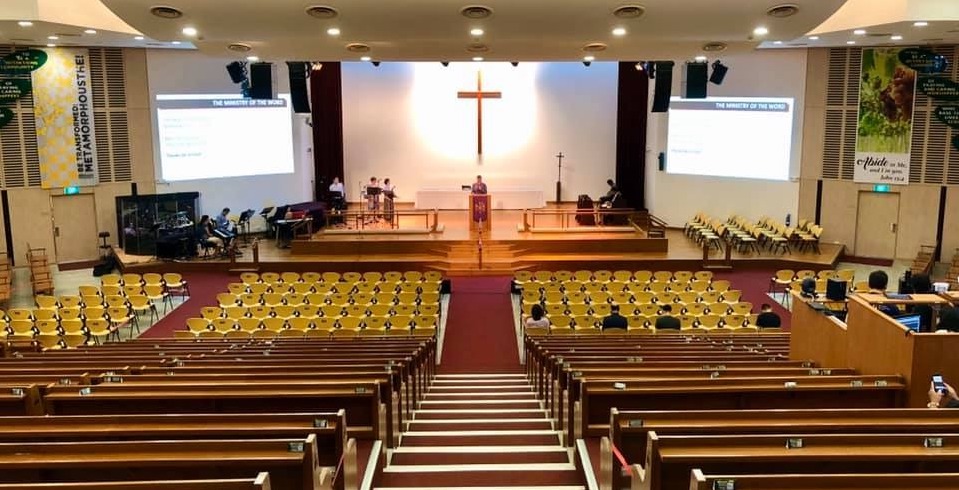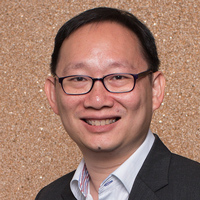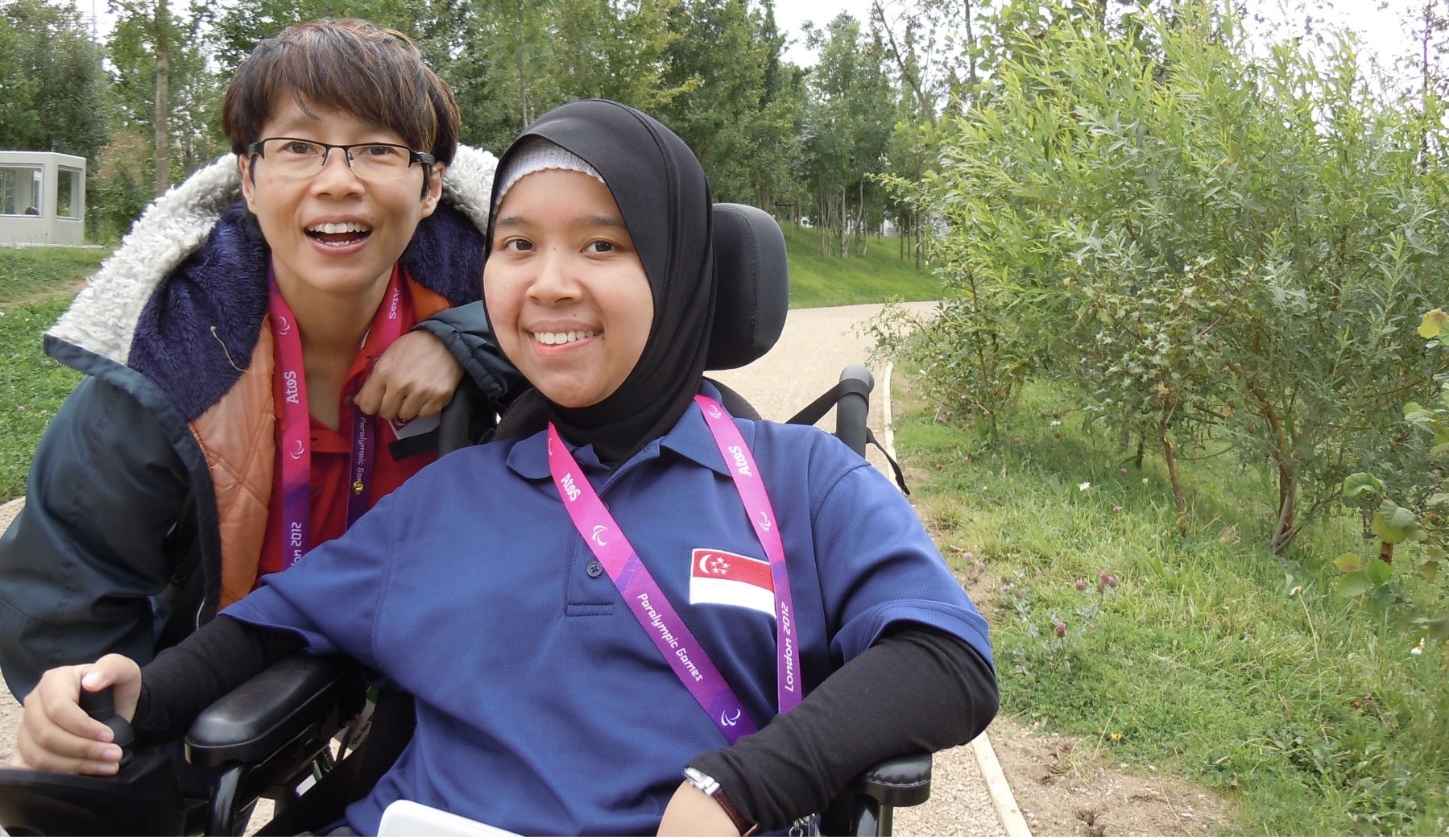
The livestreamed service from an empty hall at St John's-St Margaret's Church on March 21, 2020. Photo courtesy of Ng Zhiwen.
It has been exactly a year since Circuit Breaker measures were put in place in Singapore. Never before in our history as a nation has there been a lockdown such as this.
Time to consider what has changed after such incredible shaking; to consider what remains and what has been dismantled.
For two months, most of us had to stay home except for essential activities and exercise. This wasn’t just happening here in Singapore; most of the world was experiencing something similar to different degrees.
With the lockdown, came new norms.
We had to work from home, cook meals more often, and our kids had to get used to home-based learning. Masks became a common thing. Churches had to be shut. The country literally came to a standstill.
A year on, things have reopened substantially, but there are still many things that have not been normalised. We’re now able to see a little light at the end of the tunnel.
One thing is for certain – we’re looking forward to the day when we’re able to leave our homes without masks.
What’s standing after the shaking?
As we begin to see the possibilities of life reverting to pre-Covid days, it’s also important for us to take stock of the last 12 months, because that was a time unlike anything we’ve had before.
Our routines were turned upside down, and we all had to pivot in some way or other.
The Bible has an interesting passage that goes like this: “At that time, the Lord will shake the heavens and the earth. For whatever can be shaken will be shaken, but those things that are permanent shall not be shaken.” (Hebrews 12:27)
This is a great time to consider what has changed after such an incredible shaking; to consider what remains and what has been dismantled in our lives.
Here are a few pointers to help us in this process:
1. What have we learnt about ourselves?
What has the pandemic shown us about ourselves? As we worked from home, did we lose our discipline when we no longer had a framework of work hours and work structure?
Gaps are bound to show up, and when they do, it isn’t a bad thing. What’s bad is when we don’t do anything about it.
Were we able to pivot and take advantage of opportunities despite the restrictions that were put in place? Did we remain optimistic or did we become complainers? Were we able to see the opportunities?
There’s nothing that reveals quite like a crisis.
What’s most important is learning something about ourselves and then determining where additional work is needed.
If our productivity dropped because we didn’t have external structures in our lives, then it’s important for us develop the discipline needed for independent work.
If we succumbed to the adversity of the situation, then greater resilience is required.
Gaps are bound to show up, and when they do, it isn’t a bad thing. What’s bad is when we don’t do anything about those gaps that appear.
2. What has come to the forefront?
It’s also important for us to consider what worked for us during this period of crisis.
We discovered the need for genuine relationship and community that had to survive beyond the hi’s and bye’s.
Many of us were locked in with our families more than we’d ever been during this time. If that didn’t show us the importance of building and valuing our loved ones, we might have missed one of the biggest lessons from this pandemic.
We discovered the need for genuine relationship and community that had to survive beyond the hi’s and bye’s, when physical meet-ups were no longer possible.
Somehow, when we’re forced into a corner, or when something is stripped away from us, things of true value begin to become more apparent.
At least in my family, almost all of us learnt to cook a meal for the whole family. (I’m not just talking about instant noodles here.)
And we had to function as a team a whole lot more during the two months of lockdown.
3. Are we ready for what’s ahead?
I believe the pandemic also showed us a little glimpse of what lies ahead.
Some things will never revert to pre-Covid days.
Food delivery, online shopping, and remote meetings are just some of the obvious ones. Will there be Christians who may make online services their default weekend practice even after things fully reopen? I’m certain there will be.
Our aims and methodology must embrace the reality.
The problem here is our natural affinity for the past.
There’s always a tendency to stick to what has been done in the past and to validate them without realising that many in the younger generation are not going back that way.
They carry no nostalgia to the “old days” because they haven’t had the opportunity to formulate them.
What they’re experiencing now is what’s forming their sense of routine and lifestyle. It’s easy for us to insist on going back to the past, but in the end, that could make us irrelevant.
Instead, what’s more important is for us to look to the future. It’s to know that there are some things that have changed once and for all, and the “good ol days” are never coming back.
Our aims and methodology must embrace the reality.
On your mark …
That’s the funny thing about crises. The values that are eternal get reinforced – values of family, love, relationships, discipline and others.
But the methodology and those things that are not lasting go through an upheaval.
I believe that the last year of pandemic slowed all of us down and brought many things to a standstill. But the gun is about to go off at the starting line, and a new wave of activity is about to begin.
Before we all start running again, I pray we’ll do a serious stocktake, because when the race restarts, it’ll reveal the results of our “captivity” in the last 12 months.
This devotion was posted online by Cornerstone Community Church here. Republished with permission.
Reflection and Discussion
- Do you have an affinity for the past? What is one thing you miss about pre-Covid church life?
- One year on, what lessons have you taken away from this past year?
- What is one value that you want to guard more closely in the days to come?
MORE STORIES LIKE THIS:
“Covid has taught us to say ‘thank you’ to Grab drivers and food deliverers”: Dr Tan Lai Yong
We are an independent, non-profit organisation that relies on the generosity of our readers, such as yourself, to continue serving the kingdom. Every dollar donated goes directly back into our editorial coverage.
Would you consider partnering with us in our kingdom work by supporting us financially, either as a one-off donation, or a recurring pledge?
Support Salt&Light



